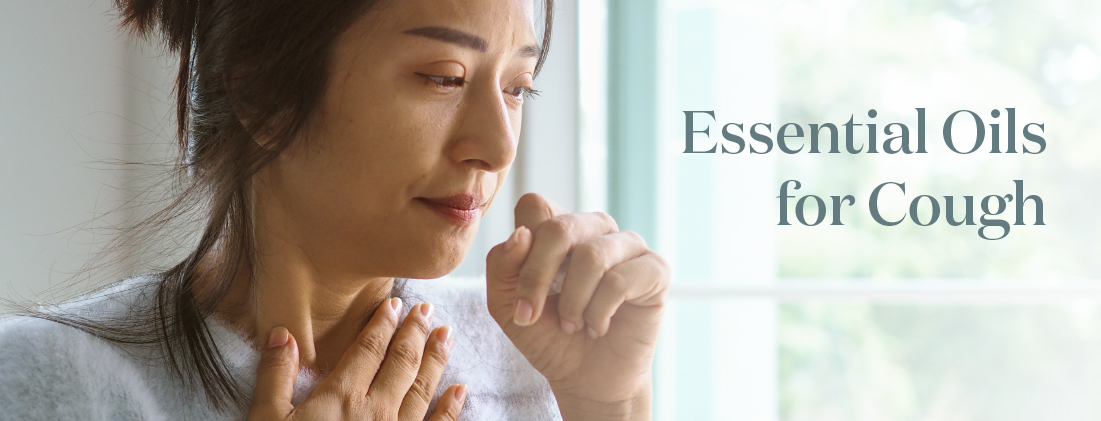A stuffy nose, hacking cough, and sore throat—we’ve all been there. When you’re in the throes of a cold, it’s only natural to seek out every remedy for relief. While there’s no instant cure for the common cold, you may find some from essential oils for coughs and colds. These oils can be inhaled to reduce cough and cold symptoms or applied topically to provide much-needed relief from headaches and muscle pain.
Let’s review some of the best essential oils for coughs and colds and how to use them.
Sacred Frankincense essential oil
Sacred Frankincense essential oil is a type of Frankincense oil that comes from the resin of Boswellia sacra trees in Oman. It has a soft, woodsy, slightly sweet aroma and includes the naturally occurring constituent boswellic acid. A 2022 clinical trial published in Inflammopharmacology demonstrated the effectiveness of a Boswellia extract formulation—enriched with boswellic acid—in improving cough symptoms.
Recognized by Health Canada, sacred frankincense essential oil can be used in aromatherapy to relieve coughs and colds. It also acts as a nervine and calmative to enhance relaxation while you rest and recover. Try diffusing this oil throughout the day or diluting it and applying it topically to experience its benefits.
Eucalyptus essential oil
One of the best essential oils for coughs and colds, Eucalyptus comes in three common varieties: Eucalyptus radiata, Eucalyptus globulus, and Eucalyptus blue oils. All three are commonly used in aromatherapy to help relieve muscle pain, headaches, coughs, and colds. The main constituent in eucalyptus oils is cineole, also known as eucalyptol. In one study published in Respiratory Research, patients who received cineole treatment for six months experienced a significant improvement in how they felt.
To experience its benefits through steam inhalation, try this simple trick: Soak a washcloth in warm water and add 5 drops of eucalyptus essential oil. Place the infused washcloth in the corner of your shower, away from direct water contact. As you shower, breathe in the soothing and cooling eucalyptus-infused steam for a refreshing and aromatic experience. Alternatively, mix 4 drops of Eucalyptus essential oil with a teaspoon of carrier oil and rub it onto your chest and throat.
Lavender essential oil
Loved for its calming aroma and skin-loving benefits, lavender essential oil also offers some surprising wellness benefits. Recognized by Health Canada, it’s recommended for use in aromatherapy to promote relaxation and alleviate headaches, coughs, and colds.
This versatile oil is perfect for diffusing or diluting and applying topically at bedtime to help calm your body and mind. Alternatively, you can mix it with body wash or bath gel and add it to a warm, comforting bath.
Rosemary essential oil
Rosemary essential oil isn’t just a favorite for skin and hair treatments—it can also help when you’re feeling under the weather. Like eucalyptus essential oil, it contains eucalyptol, a compound associated with cough and cold relief in studies such as the one mentioned above.
Interested in trying it out? Dilute 1 drop of rosemary essential oil with a carrier oil like coconut or jojoba oil, and apply it to your head, neck, chest, or under your nose.
Tea Tree essential oil

While Tea Tree essential oil is more widely known for its use in pedicures and skin care routines, it can also be used topically or inhaled to reduce the symptoms of coughs and colds, according to Health Canada. That’s why it’s a common ingredient in natural chest and vapour rubs.
To experience its effects, dilute a drop with a carrier oil and rub it onto your chest. Alternatively, add a few drops of essential oil to your diffuser and breathe in the clean, purifying scent.
Cypress essential oil
Steam-distilled from the branches of cypress trees, cypress essential oil has a refreshing, evergreen aroma that can help relieve coughs and colds.
To use it in a soothing compress, dilute 2 drops with a carrier oil and add it to a bottle of warm water. Shake the mixture to combine, and then soak your compress with it, squeezing out any excess water before applying it to your forehead. Alternatively, diffuse cypress oil in your space for a refreshing aromatic experience.
Peppermint essential oil
With its cool, herby aroma, peppermint essential oil creates a refreshing experience when inhaled or diffused. It can also be used topically in aromatherapy to help relieve coughs and colds. One study revealed that a spray containing peppermint, eucalyptus globulus, rosemary, and other essential oils effectively reduced the severity of patients’ symptoms, including coughing.
Thanks to its natural menthol content, peppermint essential oil also provides a soothing, cooling sensation to the skin. Just be sure to dilute it before using it in a spray or chest and throat massage.
Thyme essential oil
Another great essential oil for coughs and colds is thyme essential oil, which is steam-distilled from the plant’s flowers, leaves, and stems. It contains thymol, a compound shown to reduce coughing, according to a 2013 study published in the European Respiratory Journal.
Diffuse Thyme essential oil in your home or use it topically with a dilution to enjoy its warm, spicy, and herbaceous aroma, which provides natural relief from cough and cold symptoms.
Safety tips for using essential oils for a coughs and colds

Before using essential oils for coughs and colds, be sure to read the safety information on the label. If you are pregnant, nursing, taking medication, or have a medical condition, we recommend talking to your healthcare provider.
And remember, a little goes a long way! If you’re applying essential oils to your skin, patch test first by diluting 1 drop with a carrier oil and applying it to the underside of your arm. For more information on other Natural Health Products (NHP), please read our informational page.
This post is also available in: French





Leave A Comment